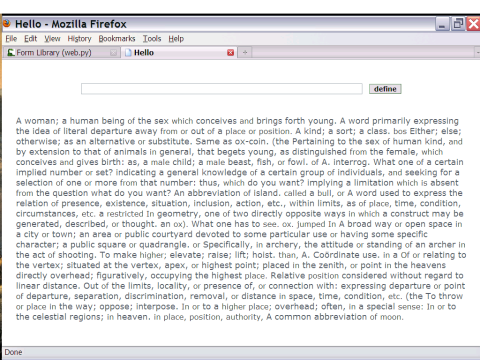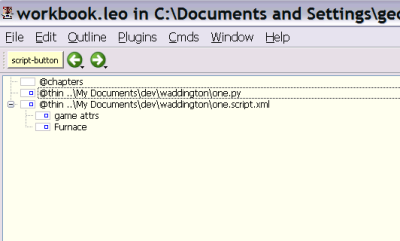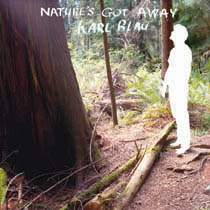Archive for the ‘ergodic research group’ Tag
towards popular Python interactive fiction (#1)
I’ve sort of touched on this topic in previous posts, but I’m trying to crystallize my thoughts here.
In my opinion there currently are three viable options for creating IF with Python: PAWS, PyF, or a custom system. An alternative form of IF can be made with Ren’Py, a visual novel system. Finally, there are two possibilities in the future: Curveship, and another I learned of recently, Prosemonger.
Two other ‘less possible’ possibilities are PUB, and any one of a number of Python mud engines (particularly those with Twisted, a lib originally built for mud IF).
But let’s talk about making a game, using Python, in prose-based, command-line IF (you know, what most people call, ‘IF”). That rules out Ren’Py, PUB (too old), and Python mud engines (too incomplete, or conversely, too complicated I think).
Curveship and Prosemonger are out too of course, as they’re not yet released. As an aside, while I’m eager to write with Curveship, from what I know I don’t think it will be much like IF as it’s played and written today. I think it will be more akin to an academic, generative narrative system, but only time will tell.
At this point a digression is in order (well, with me digressions always are in order, but I…OK, I won’t go there). When I say ‘towards popular Python IF’, what does that mean anyway? And why would you want to write IF with Python in the first place when there are at least five major IF systems that would fit the task very nicely — TADS 3, Inform 7, Inform 6, Hugo, and Adrift?
writing interactive fiction without a programming language
Warning ahead for a rambling post.
The English-like syntax of Inform 7 gets a lot of flak, mostly from programmers who say something like how programming languages should express concepts in concise and symbolic ways due to the nature of programming itself.
However one of my favorite things about Inform is not really the English-like expressions of ‘The Kitchen is a room’ or stuff like that, but how you can create new phrases. For example, from the I7 docs:
To make (character – a person) lose (point value – a number) points in the eyes of (voter – a person): …
To use that phrase, in your code you’d write something like ‘make Biff lose 10 points in the eyes of Buffy‘. Now if you were to translate that to a more conventionally symbolic language like Python for example, it might look like biff.score_points(-10, ‘Buffy’). In other words it’s a more verbose expression of the function.
It’s not that I necessarily prefer one syntax over the other — but what the first does is let you create a mini-language for describing that procedure of the program. Of course, that’s exactly what the Python function does as well. But because the first example is not necessarily couched in the syntax of I7 itself, I think the possibilities become much, much greater and more powerful.
Exactly how, well I’m still a little fuzzy on that. I’ve read a little recently about domain-specific languages, in particular I found this article about language-oriented programming. It’s rather out there but worth perusing.
I think I’ve said this before, but in using Leo recently it’s made me think more about what a program really is. It’s rather obvious it’s not a syntax file. However it seems, primarily, that few people examine and write programs in something other than a syntax file.
Leo takes that next step with its outline; I guess other tools such as debuggers and code browsers do something similar.
A question I seem to be orbiting lately is the somewhat unique case of how IF combines code and prose. In that sense IF isn’t too unlike a structured markup language like HTML, only markup languages rarely contain process — well, unless you count things like JavaScript. Regardless, language-oriented programming feels like it offers something to interactive fiction development. I think the synchronicity of the two terms is not a surprise. Dave Cornelson made an interesting post with regard to domain-specific languages at Intfiction. I don’t really like his choice of platforms but the core idea is worthwhile.
To get back to what a program is (forgetting the presumption of that statement for a moment) — an IF language that really was an IF-language creation language is another way of getting at that. If the IF author could specify how they create the work (and I mean really specify, not just within the specification of a syntax), is that another way of realizing the program?
A poet or a novelist is free to invent new constructs of language, new devices of storytelling or expression, in order to communicate the work. I guess an IF author does that by creating the process of the program — but is doing so within a defined syntax an unnecessary limitation?
A defined syntax obviously creates a framework an author can hang their hat on, and it makes it easier for authors to exchange examples and extensions to the core language. If every author created their own language for their work I can imagine any community collaboration could become difficult.
On the other hand it might turn out that certain mini-languages are more appropriate for some implementations than others. Does the barrier to entry become too high when, to write a work, you need to understand five or six mini-languages rather than just one syntax specification? Probably an IDE would obviate some of these difficulties…tools like the T3 Workbench or the I7 IDE do some of that already. But at the same time I’m not sure you’d want a very strictly defined IDE. Maybe something more like a Smalltalk environment? One with live code reloading…
Is it strange how these ideas keep turning in circles?
when you look into the machine it already looked into you
Reading more for rwet, some of the Gnoetry work:
He wasn’t rich enough or something.
Everything belonged to him. He was just
robbery with violence,
and sorrow, dishonor, and varnished boots.
So he comes here, you know, to the profound
darkness of his heart. The flies buzzed in a lofty
portico. I was only
a thing. He thumbed the messenger, invited
me over. “It’s really profitable, and
rather less pretty in shape, but you never
forget the uncle.” Afterwards I came
upon him alone. A continuous noise of the drum,
regular and muffled like the closed door
of darkness, claimed him forever.
From the first poem I found on the Internet:
The stones make you great.
The stones greet you in mosaics on the hillocks.
They seem to face me so that we can speak each to the other.
The wind breathes inconsequentially over the grass.
But it is your voice temperate with original breath
that I can almost hear it amidst the false speech of this age.
Between the wars we were lost to each other,
but now there is a transformation— a consolation.
What voice would you bring into the 21st century
now that we are of the same age—
mine and yours bound together by thistle?
Clearly that’s a far cry from this:
The leader of the troop unlocked his word-hoard;
the distinguished one delivered this answer:
“We belong by birth to the Great people
and owe allegiance to Lord Hygelac.
In his day, my father was a famous man,
a noble warrior-lord named Ecgtheow.–Beowulf, 900 AD(?) trans. Seamus Heaney
Of course, that’s kind of a cheap shot, but what about this:
Angel of beach houses and picnics, do you know solitaire?
Fifty-two reds and blacks and only myself to blame.
My blood buzzes like a hornet’s nest. I sit in a kitchen chair
at a table set for one. The silverware is the same
and the glass and the sugar bowl. I hear my lungs fill and
expel
as in an operation. But I have no one left to tell.–6. Angel of Beach Houses and Picnics by Anne Sexton, 1972
So what came first, electronic text or the contemporary text? Electronic thought or the current thought? I think it’s clear that electronic text engages and pleases some because they’re already set up for it by the circumstances of contemporary life.
On the other hand that ignores some notable movements and artists.
How far back can you go?
for Valentine’s day
maybe this is too dumb? Oh well.
egrep ‘ing.$’ sonnets.txt
O! how thy worth with manners may I sing,
What can mine own praise to mine own self bring?
Farewell! thou art too dear for my possessing,
The charter of thy worth gives thee releasing;
For how do I hold thee but by thy granting?
And for that riches where is my deserving?
The cause of this fair gift in me is wanting,
And so my patent back again is swerving.
Thy self thou gav’st, thy own worth then not knowing,
Or me to whom thou gav’st it, else mistaking;
So thy great gift, upon misprision growing,
Comes home again, on better judgement making.
From you have I been absent in the spring,
Hath put a spirit of youth in every thing,
My love is strengthen’d, though more weak in seeming;
That love is merchandiz’d, whose rich esteeming,
Our love was new, and then but in the spring,
As Philomel in summer’s front doth sing,
Of this our time, all you prefiguring;
They had not skill enough your worth to sing:
O! ’tis the first, ’tis flattery in my seeing,
To bitter sauces did I frame my feeding;
To be diseas’d, ere that there was true needing.
corresponding course (#1)
One of the authors of the IFComp 2009 game Earl Grey also teaches some cool classes in NYC, some of which happen to be on elit using Python.
The Spring class started recently. Though I make it a habit to browse the UW and Hugo House class schedules for any similar kind of course (on the craft and practice of elit), I’ve never found one, so though I’m a little behind I’ve decided to follow along with this one as best I can. There’s some great material in the syllabus and the class notes. From the first class:
Suggested exercises
This is just to grep. Use a combination of the UNIX commands discussed in class (along with any other commands that you discover) to compose a text. Your “source code” for this exercise will simply consist of what you executed on the command line. Indicate what kind of source text the “program” expects, and give an example of what text it generates. Use man to discover command line options that you might not have known about (grep -i is a good one).
[matingball ~/rwet]$ grep you | tr . \\n | sort This is just to grep. Use a combination of the UNIX commands discussed in class (along with any other commands that you discover) to compose a text. Your “source code” for this exercise will simply consist of what you executed on the command line. Indicate what kind of source text the “program” expects, and give an example of what text it generates. Use man to discover command line options that you might not have known about (grep -i is a good one). ^D Indicate what kind of source text the “program” expects, and give an example of what text it generates Use a combination of the UNIX commands discussed in class (along with any other commands that you discover) to compose a text Use man to discover command line options that you might not have known about (grep -i is a good one) Your “source code” for this exercise will simply consist of what you executed on the command line This is just to grep [matingball ~/rwet]$
Physical therapy. Take a text on paper–a newspaper, a restaurant menu, a book, whatever–and perform a transformation on it equivalent to the way one of the UNIX text commands we discussed transforms digital text. For example, to grep a book, you might highlight or cut out all of the lines in the book that match a particular string.
Playing text games on the web
Of course purists will say, ‘playing text games in the web browser’. Only in the last year or two have web clients for muds and interactive fiction really started to gain momentum. As far as I can tell there hasn’t been a single source that attempts to note them all in one place, so that’s what I’ll try to do here. I’ll treat IF and muds separately (though in many ways the use case isn’t that different).
Interactive Fiction:
Traditionally IF in the browser used java applets or java web start. Zplet and Zag are java interpreters for the z-machine and glulx, respectively, the former using applets and the latter web start. ZMPP is in this category as well.
While web start launches a new window, applets typically run within the browser window. For example, Jetty, a TADS 2 applet, looks like this:
But you also can style applets how you like within the page; for example, contrast the above with this game:
Over the last few years it seems like JavaScript has been superseding Java for many web applications, but JavaScript has been around for IF for a while.
That’s from Aunts and Butlers, a 2006 JavaScript IFComp game.
Of special note is that the IFDB offers plugins so that it’ll start a game automatically (using an interpreter on your local computer). In essence this is like using Java web start, but with a much greater variety of game formats available.
The IFDB is not only the IF site where you can play games; the IFwiki has a good list of sites with various web-based interpreters.
A lesser known z-machine/glulx interpreter is iffy. It’s a CGI application, so it needs a web host to run from (rather than running completely on the player’s computer).
To be honest, though, all of this is a lead up for the new generation of IF interpreters, the standard bearer of which is the z-machine’s Parchment.
The Parchment development site links to instructions on how an author can get their game running. Because Parchment uses the Google app engine, all the author needs to do is put their game file on a publically accessible computer somewhere. Of course, an author can download the Parchment package to their own host as well.
Parchment isn’t the only representative of this new breed of interpreters. Quixe is a work in progress to emulate Parchment for glulx games (not yet released). Leaflet was developed by Jay Is Games for playing IF at their site. Another Flash z-code interpreter is Flaxo.
Other interpreters in this class include ifrotz, written in Ruby and C:
As well as SilverGlulxe, a glulx interpreter in Silverlight:
Of special note here is Guncho, essentially a mud server written with Inform 7. As a mud server, you can connect to it with mud clients. Guncho hosts a java client on its homepage, and these work a lot like the applet and web start interpreters shown above.
Well, since I’m talking about mud servers, that’s our bridge to jump over to…
MUDS:
Web clients for muds got their start with the java applets and java web start clients just mentioned. Since many of these were made for specific games, and were an attempt in some way to compete with native clients (such as mushclient, Zmud, and so on), they often look a little fancier than comparable IF interpreters.
Also due to the server-based nature of muds, they more often have employed socket-based Flash clients for players;
That’s a souped up example of Fmud, available for free (but not open source) from the developer. Fmud is not the only Flash mud client out there, but it’s simply harder to track down these clients (compared to IF clients), and Fmud is probably the most feature complete and polished one you’ll find. Of note is Soiled, a haXe client (which compiles to Flash).
Similarly with the progression in IF from Java to JavaScript, lately there has been a progression in muds from Java and Flash toward JavaScript clients. The jMud client is mostly JavaScript with a Flash socket connection. MUDBrowser is a JavaScript based subscription service to play muds in a web browser.
There are also generic telnet clients such as anyterm that use AJAX. I even found a Firefox plugin to do a similar thing (though I couldn’t get that to work for muds very well — I think it was designed for BBSes).
The PHuDBase client is a very new php-based platform (which currently requires Google Chrome to try out).
This represents my current knowledge of what’s available; with a little more digging I know I can find more clients particular to specific muds, but I don’t think they progress beyond the examples shown here. Any other references are of course very welcome.
What can I take away from the survey? Personally I like that IF interpreters are moving toward open web standard frameworks such as JavaScript, HTML and CSS.
It’ll be interesting to see how muds approach this; by their nature muds are a little more ‘custom’ than IF games, so using platforms such as Java and Flash may make more sense, but as web services begin to integrate more and more, mobile devices proliferate, and JavaScript gets faster and easier to use, it may be the case that muds would do better going a similar route as IF. On the other hand Java and Flash are not going away anytime soon, and they do offer a richer set of options for mud client developers out of the box.
One topic I haven’t touched here is hypertext, web-based gamebooks and CYOA, boutique systems such as Twine and Twee, or the range of digital poetry and literature ‘playable’ in the browser. There obviously is a lot more to talk about when talking about ‘playing text games on the web’, and something I’d like to get to in future posts. I feel that all of these genres could learn something from the technology that each presents itself with.
Leo and pyf: literate IF development? (interactive fiction in Python #2)
Originally when I started the IF with Python series I thought I would methodically go through each Python IF lib, write a small game, compare and contrast, and so on. I still plan to do that. But as might be expected, I’ve just gone down a rabbit hole, so I’d like to see where it leads.
On a TIGSource thread maybe a month ago I heard of the programming tool Leo, which is a ‘literate editor with outlines’. By literate it means it’s a tool for literate programming (LP).
I’ve always been interested in LP, but now I suspect it was for the wrong reasons — or at least for reasons that aren’t really fundamental to literate programming. I’d checked out PyLit a bit, and my experiment with Pawsy was in a similar vein of trying to find out how to weave IF’s prose with its code in a pleasing way. I was attracted to LP because it seeemd like ‘prose, with code’. Since I like prose, I thought, hey, this might be for me.
But I had some free time today, so I finally opened up the Leo zip I downloaded a few weeks ago. Now I’m not so sure that LP is about ‘prose with code’ — at least with Leo, LP seems to say instead that a program is not just a set of code instructions, and not just a commented explanation of itself, or that thing combined — but a program is a structure that operates on multiple levels, and restricting yourself to one view of that structure, or to one way of investigating, exploring, and manipulating that structure, is an extremely limiting way to work.
I know I’m not being that coherent, as I’ve been working with Leo for less than a day. Maybe some examples will help. Here’s a screen of Leo with a pyf IF project:
Here are some closeups — first, the top left pane, the outline view.
The right hand pane is simply a log window — the bottom pane is the code view:
The @others keyword there is a Leo directive that says, ‘insert here all nodes below this one in the outline’.
So what you can do here is create the world model structure of your game, and in the top level, organize these nodes into your program structure. Already I find that this makes for much more readable code.
In the outline view you’ll see node names (headlines) that begin with @thin. This is one way of telling Leo to write that node to an external file; when Leo writes the file it expands all @others type directives, so basically you end up with a file that assembles all the code in your nodes into a single game file ready to run.
My workflow, then, involves creating the Leo outline, and then running from within SciTE the assembled program. In an ideal world I’d be able to do this directly from within Leo; Leo stores its outline files in a .leo directory, so I guess it’s possible to run the Leo outline from the project directory instead, in order to have easy access to any modules that I’m importing into the game but are not available to the whole system from site-packages (like the pyf module, for example).
So far this may not seem much different from an IDE with class/function browsing, or an editor with multiple levels of code folding. However there are some important differences.
First of all you can put anything you want in a Leo outline — you can mix Python code, xml, html, plain text, etcetera, and choose what goes into the assembled file that is the actual game source. In this way a single outline can hold many disparate components you’re using for your game, but still produce the working game code as you need it.
Second, you can do more with the outline structure than you might expect. You can clone nodes in Leo, such that a single chunk of code or text can exist at multiple points in the outline hierarchy. When you change the node at one of these points, all of its clone nodes change as well.
In other words you have multiple views of the same piece of data. When I first read about that I immediately thought this would be a great way to write IF conversation. Of course I have no idea if that will work in practice, but imagine writing an IF conversation as an outline, where you can easily reuse quips as necessary. Compare that to a flat view of conversation, as you’d find in any IF source. The question is whether the additional overhead of the outline is a net plus over a conventional layout, but intuitively it seems like this could really work.
Anyway, the real test will be to write a non-trivial game in pyf using Leo, so that’s my next step. I have to say I’ve never been this excited about a programming tool though. Most of the IDEs I’ve checked out are not that inspiring; this feels completely different.
ergodic research group
Poking around to see what digital literature, e-lit, or interactive fiction journals and zines might be floating around I stumbled across an online installation of work, <terminal><in search of a new(er) digital literature>. On that page at the bottom there also is an extensive bibliography of sorts; many of those links are kind of kaput but there’s still some interesting stuff to be found, and the projects of the installation itself are all current.
Nearly all of that stuff is multimedia work. I haven’t really found a ‘zine of ergodic text’ or something like that, though I guess something probably is out there. I feel like something of that nature could fill a niche. Pacian has his new blog (Text) Games for (Space) Crows which approaches that idea, but what I’m imagining is a combination of that and the presentation of new works.
 Leave a comment
Leave a comment




















 Subscribe to Kooneiform
Subscribe to Kooneiform



